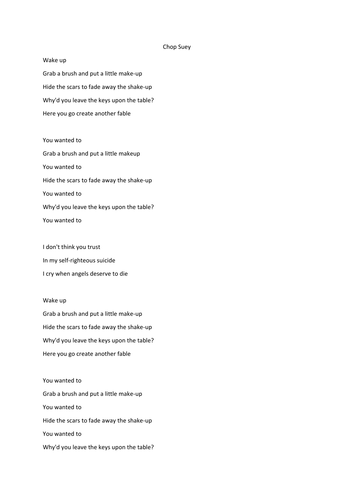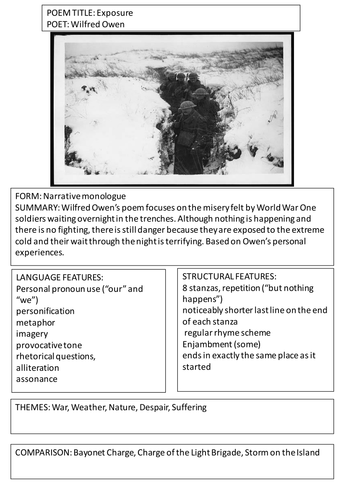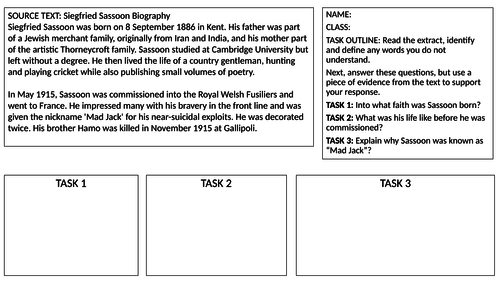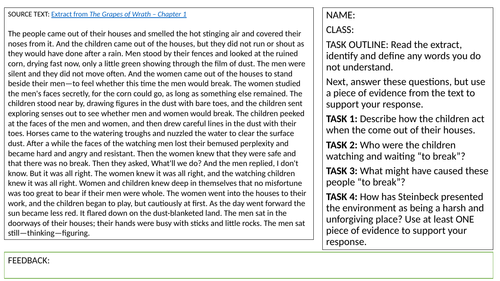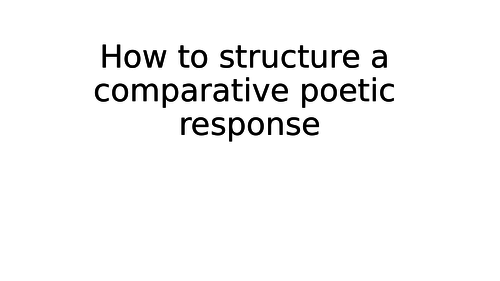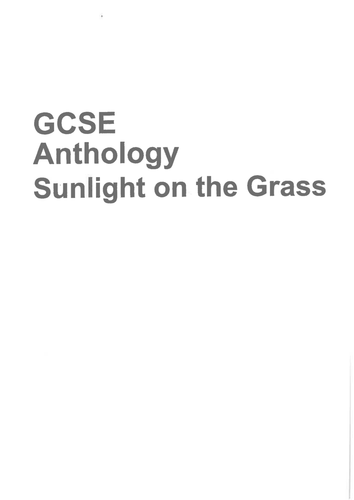
228Uploads
563k+Views
1397k+Downloads
English

AQA A-Level English Language and Literature: Othello - Lesson 1
A reintroduction lesson that should be taught with the understanding that the students have read the text beforehand. Designed as an entry point into year 13; ideal for new teachers looking to get the measure of a new class (as in my case).
I found this lesson particularly useful when combined with FAR marking the material surrounding the quotations.
You should view this as a starting point - future lessons will get much more specific.

AQA A-Level English Language and Literature: Othello - Lesson 4 (The Violence Within)
A thematic exploration of Violence within Othello - focusing specifically on Act 4. Also, the power point starts with a little revision of characters and quotations from across the play. I found this a fun lesson.

AQA English Literature: Introduction to Unseen Poetry lessons
Lessons designed to engage and interest my year 10s as they step into GCSE-land for the first time. They enjoyed the analysis of the song lyrics a lot.
I found that my previous classes found it very hard to engage with the poetry element. These lessons (combined with a couple of others that don't belong to me) worked well.

AQA A-Level English Language and Literature: Othello - Lesson 7-8 (Technical Expression and Testing)
One lesson that focuses on getting the students to use more technical vocabulary. Another lesson that tests their understanding and hits them with an exam question at the end.
All material is based upon the AQA terminology guide (not included in this pack).

AQA Power and Conflict Poetry Revision Cards
A series of revision cards designed for students to use independently to aid with the revision process. I will add to these as I go.

AQA English Language Paper 1 Section A Talking Mock Exam
A talking mock lesson (two hours long) with strategies on the slides for the students to refer to and time limits identified. The idea is that prior to each question, you are to remind students of how to answer the question. The expectation is that the class will have attempted a Paper 1 Section A beforehand - this is the lesson where they try and beat their previous scores. A quick word of warning: the exam paper is available elsewhere in my shop.

KS3: SPaG Understanding a Text Lessons (Focusing on WW1 poets and their background)
This uses a format I’ve used elsewhere. The lessons are designed to support the teaching of conflict poetry from WW1. The goal is that the students sharpen their reading skills and get a boost in their English lessons where the poet is the subject of focus.

KS3: SPaG Understanding a Text Lessons (Focusing on John Steinbeck)
Designed to be taught in support of a Year 9 class doing a GCSE-style task on Of Mice and Men. These powerpoints make good activities as part of a lesson, or they can be printed off as individual worksheets. The worksheet element contains a RAG rating system and some generic targets, suited for peer or self assessment.

AQA English Literature Poetry Knowledge Tracker Spreadsheet
A useful little tool. It allows you to RAGB(red, amber, green, blue) your students understanding/annotations of the 15 Power and Conflict poems in the AQA anthology. Also, it provides you with a poem by poem breakdown of your classes understanding/quality of annotations so you can see where the gaps are all the clearer.
The spreadsheet is set up for a class of up to 40, but the coding can easily be altered to allow for a whole year group.

AQA A-Level English Language and Literature: The Tollund Man
A lesson I put together to assist with the teaching of The Tollund Man. Pay attention to the notes element of the power point. I source a lot of information from a lot of different places here.
Also, the essay questions at the end tee up nicely into a lesson focusing on comparison.

KS3: SPaG Understanding a Text Lessons (Using Michael Grant's "Gone" series as a stimulus)
SPAG lessons can get a little flat at times. These are the worksheets I’ve designed to use with my own SPAG group. It is designed to be taught in tandem with a Dystopian Fiction SoW that ends with a reading assessment. Specifically, these lessons focus on an extract taken from Michael Grant’s “Gone” - all extracts taken from the first chapter. The aim is to develop an increased understanding of each text through the asking of more and more complex questions. The tasks can be sat as part of a lesson (I reckon they’ll take most groups between 10-30 minutes depending on the groups setting), or make ideal homework and/or extension tasks.
At the moment, the resources are set up to be taught to lower set year 7 students. But, it won’t be too hard to change the tasks to more suitable ones for any set.
UPDATE: I’ve included some versions that are more suited to be printed out. They have some basic RAG feedback grids on the back with some generic targets.

AQA English Language and Literature: Developing Essay Writing Skills for the Heaney section
I used a similar approach with the Paris Anthology section and my class found it to be very useful. The issue they were having focused on incorporating enough AO1 terminology appropriately. This lesson is designed to talk them through an approach to an essay question, starting with the poetic voice, moving on to selecting relevant areas and then placing each level of language as a different starting point before exploring ideas across the language levels. It seemed to work…
Hope others find this useful as a starting point.
Bundle

AQA English Language P1 and P2 Deconstruction Pack
A collection of resources that can be used to either go through specific English Language papers, or set up the students for a mock exam.

AQA English Language Paper 1: Brighton Rock
A deconstruction of the English Language Paper 1 examination that uses Brighton Rock as a source. I’ve lifted the model material from the mark schemes and there’s FAR related targets included. Essentially, this is a lesson that can be taught either AFTER the students have sat the exam and you want them to peer/self assess, or you could change it so that that they answer a question and then mark their efforts.
The Section B element is a bit of an experiment - peer marking creative writing is always a challenge. So I’ve given the students a series of yes/not/some related questions. The idea is that they “tick” the level next to the answer on a copy of the AO5 and AO6 mark schemes. Using that, they should be better able to work out where the creative writing fits. My peer marked creative writing has got much more accurate as a result of this.

KS3 Conflict Poetry complete unit of work (differentiated lessons for high, mid and low ability)
A complete unit of work including source poems, videos and mp3 versions of poets reading their poems. Differentiated for higher, middle and lower ability classes (each lesson back ground has a slightly different colour for an easy visual guide), this is a unit of work I designed with my Head of Key Stage 3 hat on at my last school - an entire year group was successfully taught this unit. A real success.

AQA English Literature Data Collation Spreadsheet aka "The Machine"
Attached is a spreadsheet that does an awful lot of work for you. To summarise, it does the following:
Allows for easy collation of GCSE Literature marks on a paper by paper basis AND as a whole examination
Allows for easy identification of various student demagraphics - EAL, PP and so on
Allows you to measure progress against students best, average and last marks across both papers
Works out "how many marks" until you hit target grades for individual students
Colour codes grades and marks to allow for at a glance progress checks
Once you buy this spreadsheet, you will not need to get another LITERATURE spreadsheet. The document contains instructions as to how to update the spreadsheet.
Oh, and if you do get this, I suggest you LOCK the individual spreadsheets ASAP: the document is set up to allow you to do this and still enter the data, you just won't be able to accidentally delete any of the coding, thus removing any brain overloads that might ensue.
Happy spread-sheeting!

KS3 Northern Lights Complete Unit of Work (Focus on creative writing)
Numerous lessons (though as you’ll see they can be expanded/contracted as meets your need) surrounding the teaching of Phillip Pullman’s Northern Lights (a quite awesome book) to a Key Stage 3 class. I taught this unit to a top and bottom set and got a lot out of it in terms of enjoyment and successful creative writing.
I will be using it as a starting point for a reading assignment with very little modification.
May your daemon guide you well.
ADDITION: I have adapted the material to be more focused on GCSE Language creative skills, and incorporated material drawn from the BBC series His Dark Materials. The “newer” lessons are aimed for higher ability students and deal with some more specific creative writing issues like dialogue.

Sunlight on the Grass Revision Booklet
I designed this for the old AQA specification. Now that the spec is obsolete, some of you might be thinking of turning those stacks and stacks of anthologies into resources for KS3 classes (we certainly are for year 9). As a result, you may find this booklet useful.
The booklet is essentially a copy of the entire anthology where on the left hand side of a double page spread you have the text, and on the right hand side you have space for notes. Each story is ended with generic questions and has TWO exam questions for revision purposes.
Perfect for planning lessons when you are taking an extended period of time off.
Happy reading.

AQA English Language Data Collation Spreadsheet aka "The Machine"
Attached is a spreadsheet that does an awful lot of work for you. To summarise, it does the following:
Allows for easy collation of GCSE Language marks on a paper by paper basis AND as a whole examination
Allows for easy identification of various student demagraphics - EAL, PP and so on
Allows you to measure progress against students best, average and last marks across both papers
Works out "how many marks" until you hit target grades for individual students
Colour codes grades and marks to allow for at a glance progress checks
Once you buy this spreadsheet, you will not need to get another LANGUAGE spreadsheet. The document contains instructions on the ARRAY tab as to how to update .
Oh, and if you do get this, I suggest you LOCK the individual spreadsheets ASAP: the document is set up to allow you to do this and still enter the data, you just won't be able to accidentally delete any of the coding, thus removing any brain overloads that might ensue.
I am using this at my current school and there are several other schools who are using this system with good reports.
Happy spread-sheeting!
PS - Yes, there is a page that reads exactly the same but for a version that caters for the AQA Literature course. The spreadsheets are different. Here's the link/address to the LITERATURE version:
https://www.tes.com/teaching-resource/aqa-english-literature-data-collation-spreadsheet-aka-the-machine-11405407

Creative Writing: Experimental poetic forms
I enjoy teaching this lesson in and around poetry units of work. Essentially, it demonstrates three different approaches to creating poetry, culminating in the students creating their own Shakespearean Sonnets (you'll struggle to get this done in a single lesson - I designed this for a double period).
You'll need the following to complete this lesson:
2 different coloured paper types
Glue
Scissors
The students to have prior knowledge of the Shakespearean Sonnet Form
Enjoy.



